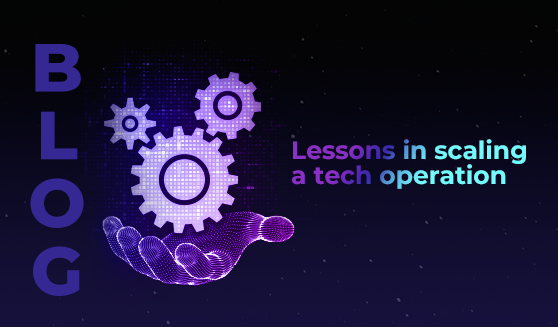
Why sustainability is the heart of the smart city revolution
The smart cities of the future will use tech to lower emissions, cut urban temperatures, and improve quality of life in highly populated areas.


We recently shared our interview with LEAP 2024 speaker Oscar Barranco Liébana (Integrated Operations Platform Director, FIFA World Cup Qatar 2022). He gave us a glimpse into his experience of running the integrated tech platform for one of the biggest events in the world – and the tools he used to manage the extreme pressure that comes with such a major task.
Later, we asked him to reflect on the lessons he learnt from the FIFA World Cup in Qatar; particularly the learnings he’ll carry with him throughout his career.
And whether you’re leading tech operations for global sporting events, scaling a startup, or expanding a tech company into new markets – these lessons are valuable for tech leaders at every level.
Liébana highlighted the importance of effective management – and pointed out that in the current technological landscape, management of innovation needs to happen in conjunction with the management of people. “The optimisation of global collective intelligence, human-AI collaboration and effective structured stakeholders’ interaction produces high quality innovation,” he said; “and the power and impact of a supermind innovation framework” expands the effectiveness of innovation management.
He also discovered the power of the snowball effect. Scaling to the point of global impact isn’t something that happens in large steps; it happens through the accumulation of smaller collaborations and initiatives. When it comes to an event like the FIFA World Cup, Liébana said it’s necessary to “understand how national & international networks behave to generate constructive and evolving chain reactions and domino effect, which leads to massive collaboration and strong engagement towards global impact.”
Not all collaboration can be managed in the same way. “Distinguish between open collaboration and close coordination,” Liébana advised, because each requires a different approach to management and governance – “and both are needed in mega events.”
Speaking of mega events and global scaling, it’s critical that you enable solid engagement from every stakeholder, both nationally and internationally. To facilitate that, you must develop an innovation and tech agenda in collaboration with stakeholders – “to produce very strong and clear win-win benefits.”
Beyond that, it comes down to people. “Seek ambitious thinkers,” he added, and encourage them to explore the boundaries of their vision – because “their vision can propel your project beyond conventional limitations.”
And work to cultivate genuine, meaningful connections with every person you work with. “Build honest, personal relationships over purely professional networking. Surrounding yourself with trusted, committed, and talented individuals fosters better communication, collaboration, and intelligence, which actually makes things flow easier and more effectively.”
What about the tech itself? How can you ensure you’re developing the right tools to meet the needs of a large-scale operation, or to enable your business itself to scale in international markets?
For Liébana, it starts with strong data governance. “Data sources from fans, private and public organisations come with different data regulations and restrictions,” he pointed out. “Make sure to govern data management effectively from the very beginning and address all key international legal regulations.”
And the data itself must be high quality – particularly if you’re using AI technology to allow you to scale: “Invest in data sources that ensure accuracy, completeness, and relevance, and choose a platform with robust data ingestion capabilities that can handle diverse formats with ease and agility.”
With the rise of AI, we’re seeing an explosion in the number of AI companies seeking partnership opportunities. But don’t rush in: “choose wisely which partners to engage in AI-related initiatives,” because the strength of your AI-related network depends on “serious coordination and commitment to high quality data.”
A potential partner might be enthusiastic and eager to collaborate – but that doesn’t necessarily mean they’re offering an ideal solution for you.
Finally, Liébana said, “let me highlight the most meaningful lesson learnt from this tournament, particularly for me. It was the secret ingredient for this global success: the incredible talent, persons, and hearts around you, which have given the best they had for so many years, on a daily basis, and with such strong commitment to really ‘deliver amazing’.”
Thanks to Oscar Barranco Liébana. Do you want to network with tech leaders who are transforming industries and creating awe-inspiring experiences? Pre-register now to attend LEAP 2025.

The smart cities of the future will use tech to lower emissions, cut urban temperatures, and improve quality of life in highly populated areas.

Discover the cities that rank highly for smart city preparedness, and learn why locally relevant innovation is more important than cutting-edge tech.

If you’ve ever thought about becoming a tech investor, read this – learn why investors are the quiet force shaping the future of the industry.

The smart cities of the future will use tech to lower emissions, cut urban temperatures, and improve quality of life in highly populated areas.

Discover the cities that rank highly for smart city preparedness, and learn why locally relevant innovation is more important than cutting-edge tech.

If you’ve ever thought about becoming a tech investor, read this – learn why investors are the quiet force shaping the future of the industry.